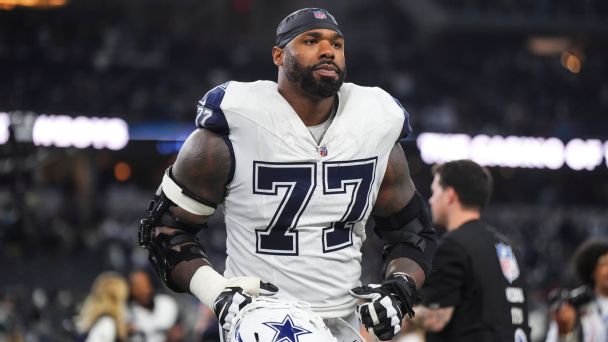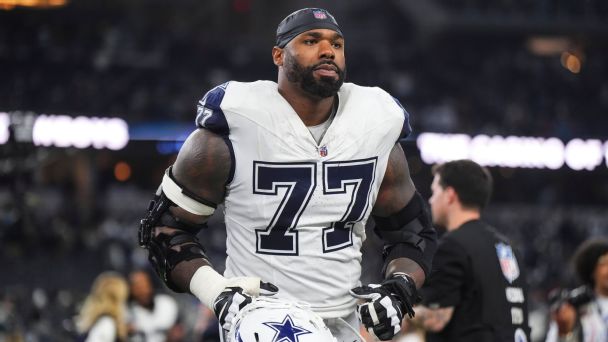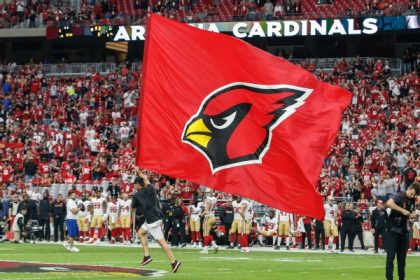
FLORHAM PARK, N.J. — Three decades before Tyron Smith, it was Ronnie Lott. Different era, same premise: A shotgun marriage between an aging football legend and a success-starved franchise, one looking to recapture past glory, the other trying to find it for the first time in an eternity.
On March 8, 1993, Lott was introduced by the New York Jets as “a Hall of Famer,” one of the first big names in the NFL’s free agency era to sign with another team. There was a traditional news conference at the team facility, a jersey presentation/photo op and a declarative mission statement from the iconic safety.
“I think I’ve got two years left,” Lott, a 10-time Pro Bowler and four-time Super Bowl champion with the San Francisco 49ers, said that day, two months before he turned 34. “For me to tell you I’m trying to build something with them, that’s crazy. I don’t have that many years to build anything. I came here to win right now.”
Two weeks ago, Smith conveyed the same message, albeit from a different platform: a video call with reporters. Such is the new world, where just about everything — including free agency — can be done remotely.
Smith, 33, with eight Pro Bowls on his resume but no Super Bowl rings on his fingers, said he signed with the Jets because they can “go all the way.”
“I’m going to do everything in my power to get to that goal,” said Smith, who played 13 seasons with the Dallas Cowboys.
No team does this quite like the Jets. In a perpetual search for the championship puzzle’s final piece, they have become a sanctuary for graying stars. They do the Rent-a-Legend thing like nobody’s business.
In the free agency era, from 1993 to present, the Jets have acquired more future Pro Football Hall of Famers and league MVPs after age 30 than any team, according to data on the Hall of Fame website. The totals are nine Hall of Famers and four MVPs.
Roll call, please:
-
In the 1990s, their future Hall of Famers were Lott, wide receiver Art Monk and safety Steve Atwater, plus quarterback Boomer Esiason as a former MVP.
-
In the 2000s, it was cornerback Ty Law, quarterback Brett Favre and guard Alan Faneca, with Favre also a three-time MVP.
-
In the 2010s, their Hall of Fame-bound players were running back LaDainian Tomlinson, pass rusher Jason Taylor and safety Ed Reed. Tomlinson also was an MVP.
Now, of course, they have quarterback Aaron Rodgers, 40, a four-time MVP whose blind side will be guarded by the ultimate security blanket. Smith “may be the best pass protector of all-time,” according to Jets general manager Joe Douglas.
Some of the aforementioned legends flopped in New York, unable to find what made them great. Most approached their previous level, if only briefly. None of them helped the Jets to a Super Bowl.
And the beat goes on.
Welcome, Mr. Smith.
“This franchise is always chasing winning,” Esiason said. “It never stops.”
THE JETS ARE in a familiar place: They’re good enough to dream, believing they’re on the cusp of ending their droughts — 55 years without a Super Bowl, 13 years without a playoff appearance. In addition to Smith, they acquired Pro Bowl pass rusher Haason Reddick and former 1,000-yard receiver Mike Williams, both of whom will turn 30 during the season. They’re betting big on 2024.
They felt this way in 1993, when they imported Lott and Esiason. They felt the same vibe in 1999, when former coach Bill Parcells loaded up for a Super Bowl run with Atwater and others.
It was the same deal in 2008, when Favre and Faneca joined the ranks. Ditto, 2010, with Tomlinson and Taylor swooping into town in search of their first Super Bowl rings.
The Tomlinson-Taylor team made the playoffs, but the others didn’t — and the consequences were dire.
The coaches in ’93 and ’08 — Bruce Coslet and Eric Mangini, respectively — were fired after the season. Parcells walked away after the ’99 season, which unraveled on opening day when quarterback Vinny Testaverde tore his Achilles. The same thing befell them last season with Rodgers, who was acquired last April in a blockbuster trade.
When the Jets get into a win-now mood, it’s either go big or go home, which means there’s immense pressure on current coach Robert Saleh.
“There’s no way this isn’t going to work,” said Rex Ryan, who coached the Jets to their last playoff appearances in 2009 and 2010. “It’s absolutely, 100% going to work. If it doesn’t, heads are going to roll.
“The Jets are all in. It’s all or nothing. It’s for the head coach. It’s for the GM. It’s for everyone in that building. They’re loading up for bear. If they don’t do it, it’s like, ‘Are you s—ting me?'”
The Jets believe a healthy Rodgers, who has rehabbed his surgically repaired left Achilles, will raise the level of everyone around him. Duane Brown, the left tackle who allowed the sack that resulted in Rodgers’ injury, is gone. So is his replacement, Mekhi Becton. They’re entrusting that job to Smith.
“He’s one of the best to ever do it — a great, great addition for the Jets,” said former Jets and Philadelphia Eagles pass rusher Vinny Curry, who faced Smith many times. “He’s strong, has arm length, good footwork and gives 100% all the time. A future Hall of Famer.”
Smith was a franchise pillar for the Cowboys, but age, injuries and economics led to his exit. Owner Jerry Jones, speaking last week at the league’s annual meetings, said they “couldn’t afford him.” The Jets loaded their contract offer with playing-time incentives, providing the opportunity to earn up to $20 million on a one-year deal that has a $6.5 million base value.
Players dream about staying with one team for their entire career, but it rarely happens. Lott, Favre and Tomlinson were synonymous with the 49ers, Green Bay Packers and San Diego Chargers, respectively, but they left or were nudged toward the door. It was the same for Faneca (Pittsburgh Steelers) and Taylor (Miami Dolphins).
“Everybody knows how the business goes,” Smith said. “Sometimes you have to leave.”
THREE DECADES LATER, Lott still exudes passion when he talks about football. He said he chose the Jets because he loved watching Joe Namath as a kid and because he had so much respect for Pete Carroll, their defensive coordinator at the time.
Already one of the greatest defensive players in history, Lott didn’t need a legacy-booster. He was, as Parcells used to say, going to Canton on roller skates. He also wasn’t seduced by the allure of New York, which often attracts older players interested in setting up their post-football lives on Wall Street or in the media world.
“What mattered to me was playing ball — you’re balling!” Lott said. “I will say this: When you’re balling and you’re doing really well in that Jet community, where you’re feeling it like they’re feeling it, there’s nothing better.”
Lott was a trailblazer, the first unrestricted free agent to sign with the Jets. It was a pretty big deal in New York: “A Lott to Like,” the Newsday back page screamed. After his news conference, he sat courtside at a New York Knicks game, just as Rodgers did 30 years later.
Lott brought a champion’s work ethic to the team, often staying after practice to pound a tackling bag by himself for 20 minutes. By the time he got to the locker room, his forehead was covered with beads of sweat and flecks of grass. Lott made the Pro Bowl that year, inspiring the younger players with his bone-rattling hits and leadership.
The team came up short at 9-7. No postseason. But no regrets, Lott said.
“Always in life, you try to go places where you feel like you can win and people you can win with,” Lott said.
Still, a blueprint was set: If you think you’re close to something special, reach for a star and hope his greatness impacts the entire organization.
“We’ve never really built something that’s on its own,” said former personnel director Pat Kirwan, who was instrumental in signing Lott and Monk. “There are two models. There’s the Green Bay model (build through the draft) or there’s the other model, which is keep renting until you win.”
Favre was the ultimate rental, a hired gunslinger that was supposed to put them over the top in 2008. Favre was doing Favre things, leading the Jets to an 8-3 start, but he tore a biceps tendon in his throwing arm and the season collapsed.
No postseason.
After losing the AFC Championship Game after the 2009 season, Ryan signed Tomlinson and Taylor to supplement a talent-rich roster.
Tomlinson found a second wind, won a starting job and rushed for 914 yards. He probably would’ve eclipsed 1,000 for the ninth time, but he sat out the final game to rest for the playoffs — a team-first move that resonated within the organization.
Taylor didn’t make a splashy impact, with five sacks, but he impressed with his toughness and work ethic. Ryan said he coached him hard, adding that Taylor never complained.
“They were like the rest of my locker room; they never had a ring,” Ryan said. “They all wanted a ring, and we were going to give them an opportunity to chase the ring. That’s what made it neat. They wanted that damn ring.”
They lost for the second straight year in the championship game. No Super Bowl.
In 2013, Ryan reached into his Baltimore Ravens past, signing safety Ed Reed in the middle of the season. It was a last hurrah for Reed, 35, who wasn’t close to his former self but still managed three interceptions in seven games for an 8-8 team.
In 2015, they got a 10-interception season out of Law, whose Pro Bowl was the bright spot in a 4-12 season. Faneca gave them Pro Bowl seasons in 2008 and 2009, galvanizing a talented offensive line before he became a salary-cap casualty.
Not every future Hall of Famer was able to recapture what they had. Art Monk, one of the greatest players in Washington history, had slowed down and caught 46 passes in 1994. Atwater, coming off a Pro Bowl with the Denver Broncos, battled injuries and was a non-factor in 1999, the championship year that wasn’t (see: Testaverde’s Achilles).
No move generated more excitement than the 1993 trade for Esiason, who grew up only 25 minutes from the Jets’ old training facility on Long Island. It was the perfect homecoming story, a former MVP returning to his roots. Esiason was reunited with coach Bruce Coslet, his former Cincinnati Bengals offensive coordinator. The cherry on top was being so close to home. His dad watched every practice from a lawn chair on the sideline.
Finally, the Jets’ stars were aligned. Or so it seemed.
As it turned out, the franchise slipped into one of the darkest periods in its history. Esiason had three head coaches in three years and the Jets went from 9-7 to 6-10 to 3-13. And so began a 30-year pattern: Intermittent periods of hope, with future immortals climbing aboard for the journey.
“Each one of us was coming out of a different situation that led us to the Jets for whatever reason,” Esiason said. “For me, it was the best place at that moment.”
He paused.
“Unfortunately, it just never truly stabilized,” he said. “It was three coaches in three years and a lot of crap.”









